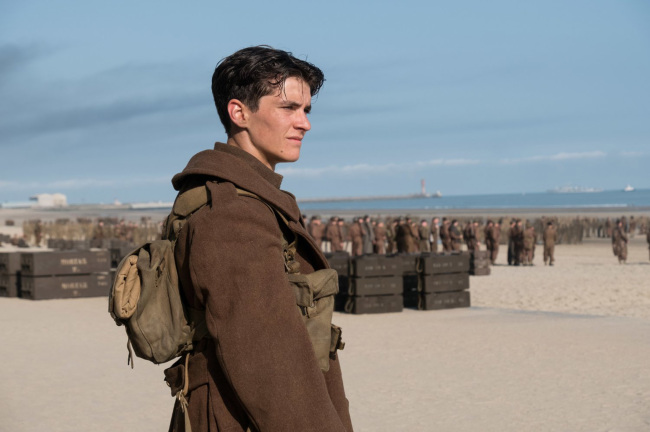“Dunkirk” is not a typical war movie.
There are no brothers in arms, no flashbacks to simpler times and pretty wives and girlfriends left behind, no old men in situation rooms pontificating about politics or helping with exposition. There’s no talk of Hitler, or Germans or battlefields or trauma or mothers. In fact, there’s hardly any talk at all, or, for that matter, even any characters in the traditional sense. But don’t be mistaken: Christopher Nolan’s “Dunkirk” is a stone cold masterpiece.
It’s a stunningly immersive survival film told in 106 thrillingly realized minutes. Nolan puts the viewer right in the action whether it’s on the beach with 400,000 men queued up and waiting for a rescue that may never come, on the waters of the English Channel in the little civilian ship headed into hostile waters with only an aging man and two teenage boys aboard, or in the air above in the two lone Spitfires that are quickly running out of fuel.
 |
Fionn Whitehead in “Dunkirk.” (Melinda Sue Gordon/Warner Bros.) |
I’ve never experienced anything quite like “Dunkirk’s” intoxicating immediacy. The screen and images envelope you with urgency, dread and moments of breathtaking beauty and grace as you wait with the soldiers, as the title card at the beginning says, for deliverance.
The story begins on the ground, with a young soldier, Tommy (newcomer Fionn Whitehead) wandering the deserted streets of Dunkirk looking for water and a place to relieve himself. Propaganda flyers float down to the ground reminding the soldiers of something they’re already well aware of -- that they’re surrounded. “Surrender + Survive!” the flyers read as Hans Zimmer’s gently ominous score plays in the background telling us that while it may be calm for a moment, it is not safe. A deafening gunshot breaks the silence, and, fair warning, your racing heart will not stop for quite some time.
Nolan follows Tommy back to the beach where soldiers stand in long lines that stretch to the water, where no boats approach. His part is nearly silent, his motivations unknown. They are all haunted shells, stripped of meaningful weapons and a military purpose. He and the rest just know they need to get off the beach at any cost.
We accompany Tommy as he tries to achieve that objective which eludes him with almost comic frequency. He’s the unluckiest lucky fellow out there.
Occasionally we get the sobering perspective of the higher ups, compliments of the great Kenneth Branagh as Commander Bolton.
In the air there are the two Spitfire pilots, Farrier (played by Tom Hardy, whose face is once again largely obscured but who can act circles around many of his contemporaries even with just the use of his eyes and eyebrows) and Collins (Jack Lowden). They get to be the lofty, classical heroes of war films past as they shoot down the enemy. Hardly has a film ever made you feel as in the moment as this.
And on the sea, the three civilians, Mr. Dawson (Mark Rylance), Peter (Tom Glynn-Carney) and George (Barry Keoghan) who, like so many during the Dunkirk evacuation, took it upon themselves to captain their own small vessel and journey into war dressed in their seaside knits and armed only with lifejackets and blankets to help save their country’s stranded men. They’re the beating heart of film, especially when pitted against a shell shocked soldier (Cillian Murphy) who is determined to stop them from going back to Dunkirk.
These narratives intertwine and loop back and repeat from different vantage points with stunning effectiveness -- never seeming redundant or dull. Nolan finds suspense at every angle, and ramps up the tension with the help of Zimmer’s ticking score. While, there might not be character arcs to speak of, the performances are first-rate nonetheless (even pop star Harry Styles, who might just have another viable career option).
Nolan continues to be unparalleled in Hollywood -- working on a scope that few are able to. As many filmmakers experiment with the small screen, Nolan has only gone bigger and bolder with his commitment to film and Imax. What a case “Dunkirk” is for the movie theater. Not only that, “Dunkirk” is far and away the best film of the year, and Nolan’s finest too.
See it big and then see it again.
By Lindsey Bahr
AP Film Writer








